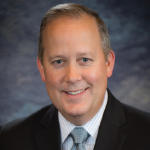On June 3, Steven C. Echard, IOM, CAE, relocated to Atlanta to begin his new role as executive vice president of the ACR, his third term with the organization over his distinguished career in association management.
Since 2014, Mr. Echard has served as chief executive officer of the American Association for the Study of Liver Diseases (AASLD) in the Washington, D.C., area. He helped AASLD increase membership engagement and global outreach, refine its strategic plan, and modernize and expand its programs, including the launch of the AASLD Foundation.
From 2005–2014, he served as executive director of the Rheumatology Research Foundation, which grew during his tenure from four to 21 full-time employees and increased its annual budget from $3.5 million to $15 million. The foundation raised more than $100 million for arthritis research and rheumatology career awards while he served as its professional leader.
Mr. Echard began his career with the ACR in 1992 as an intern. He served in several roles at the ACR, including positions in the education, research and training departments, and six years as the director of government affairs. In 1999, he served as the staff liaison for the ACR Strategic Planning Committee, which resulted in his final position as director of governance before he left the ACR in 2002.
Mr. Echard has also served as the executive director of three other healthcare organizations: the American Society for Histocompatibility and Immunogenetics (ASHI), the Osteoarthritis Research Society International (OARSI) and the Society for Biomaterials (SFB).
Mr. Echard is a current board member of the American Society of Association Executives (ASAE) and a two-time recipient of its Power of A Gold Award. He is past chair of the Certified Association Executive (CAE) Commission, the independent body responsible for the certification of association executives who have demonstrated the wide range of knowledge and expertise necessary to lead an association.
Drawing inspiration from the ASAE’s public policy campaign, The Power of A (associations), he cites the important role professional associations play in society, including enhancing members’ professional skills, improving systems and structures, contributing to the economy through innovation and professional development, promoting volunteerism among its members, and creating professional standards for quality and safety.
Mr. Echard is a graduate of the Institute of Organizational Management at the University of California, Los Angeles. He and his wife, Tami, an instructional designer/ educator with the Georgia Department of Education, have three children: Drew, Kylie and Taylor. He spoke with The Rheumatologist about his vision and goals for the ACR and ARP, as well as professional associations in general, as he begins his new role.
TR: What inspired you to pursue this opportunity at the ACR at this point in your career?
SE: The size and scope of the ACR as an organization was one important factor. In many ways, the ACR is leading the way in medical associations. It is a very complex organization with many noteworthy initiatives. It also has a long history of success. I have found that whenever the ACR wanted to accomplish anything, no matter what goals its leadership set its mind to, it has accomplished it. Right now, the ACR’s registry [Rheumatology Informatics System for Effectiveness (RISE)] and other innovative approaches to education are very exciting to me, and I am proud to be part of this dynamic organization.
One major strength of the ACR is the unity within the field and the organization. Although people may agree or disagree, they serve together in unity and purpose, which builds loyalty within the organization. This makes the ACR a more successful and influential organization when it approaches other organizations and tries to build partnerships and coalitions. It has more clout. I want to help ACR leaders maintain that unity and build on it.
TR: What are some of your initial goals and your long-term vision for the growth of the ACR and ARP, including quality, medical education and advocacy?
SE: I think leadership can continue to build on the ACR’s strengths, especially in the quality and outcomes areas. The ACR has been a leader in the development of practice guidelines and practice measures, and is also leading the way with the registry, as I mentioned. RISE allows us to provide robust, accessible clinical data that can be used to answer relevant clinical questions in rheumatology. I would like to see increases in the projects commissioned and the number of publications based on that data.
When it comes to education, the ACR has an opportunity to examine its structure to increase learning opportunities. The ACR already has great online learning programs, including the new ACR Beyond, which provides online access to innovative educational content. There are multiple organizations vying for our members’ interest in this area. We have an opportunity to expand what we offer in education or even partner with other groups.
The ACR’s unity gives it power to influence other organizations when we partner with them. We can learn so much from increased collaboration with other medical societies and provider coalitions, and more networking within the medical society community. I think the ACR can thoughtfully consider increasing programs and volunteer opportunities in all areas of membership, which would satisfy the desire for connections and leadership development. These programs and events could position the ACR as a major contributor on issues around access to care, maintenance of certification, and other key areas.
TR: What are your thoughts on how the ACR can address the projected future pressure on the rheumatology workforce?
SE: Dealing with the challenge of increasing demand for rheumatology care requires innovative ideas. We should consider appropriate multidisciplinary approaches to ensure timely access to care for patients. Advances made in healthcare IT [information technology] infrastructure, more advanced communication, and connected medical devices that enable clinicians to evaluate, diagnose and treat more patients remotely could be one solution. The ACR understands the everyday issues that community rheumatologists face. A structure is already in place for the ACR to play a leading role in improving care at the local and federal levels. ACR volunteer leaders and professional staff have become recognized sources of information and collaboration on many issues, and we will continue to work to increase the visibility of the specialty.
TR: You’ve been extensively involved with ASAE and say that you’re passionate about what ASAE calls the “Power of Associations.” What have you gained from your advanced leadership training, mentorship and serving as a thought leader in your profession of association management?
SE: One of the great things about being involved in my own professional society is that it gives me a different perspective on what is required to help volunteer leaders be successful—what it takes to work as a leader, including the appropriate relationship with staff, what resources you can provide to your volunteer leaders, and what support they need from staff. My experience serving on the ASAE board allows me to have a better understanding of different levels of association leadership, and what it takes to be considered a leader in a professional organization. You have to be considered a real thought leader to rise up in any organization.
Susan Bernstein is a freelance journalist based in Atlanta.



